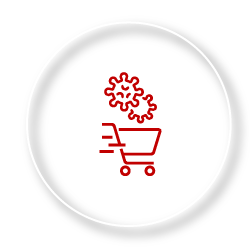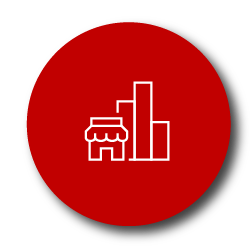The COVID-19 outbreak has changed how we socialise, work, eat, exercise, and, of course, shop. Therefore, the Coronavirus has had an immense impact on the retail industry. To remain competitive and relevant as a retailer through these tough times, it is critical that you put measures in place to serve the change in consumer behaviour.
In this article, we discuss the effect that COVID-19 has had on consumer purchase behaviour, retailer behaviour and what you as a retailer can do to remain competitive in the market.

The effect of COVID-19 on consumer purchase behaviour
Due to the changes in the daily lives of consumers, there are changes in consumer behaviour. In a time of crisis, it is expected for new consumer trends to emerge that influence how often we visit stores, the time of day that we visit stores, the time we spend in-store as well as the products we buy and the quantities we buy them in.
On the 11th of March 2020, the World Health Organization declared COVID-19 a global pandemic. As a result, national lockdowns were declared in many countries all over the world in an attempt to curb the spread of the virus. This instilled fear, anxiety and uncertainty in the lives of many. Understandably so.
It also lead to doubt about the availability of goods, which, in turn, led to consumers panic buying and stockpiling products. Retailers and suppliers struggled to keep up with the sudden surge in demand while dealing with new regulations to keep their staff safe and overcome supply chain challenges that were now evident.
Meanwhile, e-commerce experienced unprecedented global traffic growth as consumers avoided crowded spaces where they risked exposure to the virus. ‘Click and collect’ and home delivery was expected to gain popularity over the course of the next few years, but were suddenly widely adopted and are expected to remain a popular option in the future. Retailers that did not have the necessary resources such as online stores or smart device applications in place, had to scramble to optimise on this opportunity to reach a wider market.
Learn how to respond to rapid changes in consumer demand with our free Ebook
A study done by McKinsey and Company found that American consumers cut down on the number of stores visited per week to avoid exposure. This study also shows that brand loyalty has become less important as consumers are shopping from the available product range to avoid having to visit another store. Therefore, a transfer of demand was evident in situations where a preferred brand was out of stock.
If we consider the South African context, News24 reported that over three million South Africans have lost their jobs due to the national lockdown between the months of February and April 2020. This has an immense impact on the spending power of South Africans and consumer buying behaviour. This results in consumers shopping more conservatively. Purchases are focussed more on basic needs rather than wants and sales of luxury products have declined.
The apparel industry also observed a shift in the product categories that consumers were buying. Working from home became the new normal, and online conferencing has gained major popularity during this time. As a result, there was a 167% increase in demand for top-half apparel categories, including shirts and jackets, when compared to the same period last year.
Another pertinent change in consumer behaviour is that consumers had an increased inclination to support local brands and stores. This could be seen as an attempt to aid local economies and to assist small businesses to stay afloat to reduce further job losses.

The effect of COVID-19 on retailer behaviour
Unfortunately, many retailers had to close their doors due to the economic impact of COVID-19. Retailers who have managed to keep their doors open had to learn and adapt to navigate through this time whilst having to minimise staff, keep up with demand fluctuations and overcome supply chain challenges.
Retailers have also had to put safety measures in place to ensure the safety of their staff and shoppers. This includes providing sanitation upon entry of a store, a ‘no mask, no entry’ rule, limiting the number of people in a store, social distancing measures and reducing shopping hours to adhere to strict lockdown rules. Some apparel retailers prohibit the trying on of clothing items in an attempt to minimise contact with merchandise.
As a result of panic buying, many retailers limited the purchased quantity of some in-demand items such as personal hygiene products. For example, British pharmacy chains Boots and Lloyds Pharmacy limited hand sanitisers to two per person.
Assortment planning also plays a particularly important role during this time to ensure that retailers stock the items that customers want to purchase and that enough space is allocated to these product categories.
Need to respond to rapid changes in consumer demand? Find out how with our free Ebook
With the closure of many companies or the reduction of workers, supply chains have been disrupted and therefore merchandise availability has changed. Retailers can use sales data for the previous period, along with recent sales data to determine what to stock to keep their assortments localised.
When using a specialised assortment planning tool, such as DotActiv Enterprise, different metrics can be used to manage inventory to ensure that your product range is wide and deep enough to satisfy the wants of your shoppers. Planograms also have increased importance to ensure that the allocation of shelf space is data-driven to maximise sales potential.

What is next for retail?
The impact of COVID-19 has changed the future of retail and consumers are adapting to their new normal. In order to remain relevant, retailers must be able to provide their shoppers with the products and services that they want.
One example worth mentioning is the rapid adoption of online shopping by consumers during lockdown. This was something that many retailers only expected to happen in a few years and for that reason, many were not prepared.
In Canada, online sales have doubled since the Coronavirus was declared a global pandemic in March 2020. It is more important than ever before to have an online presence that ensures a pleasant shopping experience to remain competitive in the market. The convenience that this offers the customer will remain and therefore it is worth investing in an online shopping platform if you have not already done so.
As a result of nationwide lockdowns in countries across the globe, economies have become more unstable and consumers are uncertain of what the future may hold in terms of economic hardships. During these tough economic times, it is important to understand that affordability and value for money will be one of the most pertinent factors in consumer buying decisions. Therefore, it is also important to consider your assortment planning decisions and make range changes were necessary to adapt to the economic situation, which is expected to last for a few years.
Marketing is an important factor of retail success and the way in which retailers market during this time is critical. It can result in loyal customers, but it can also be detrimental to your business if not approached correctly.
As a retailer, it is worth investing your time and money to understand how your target market is reacting during this time to be able to connect with your consumer on a personal level. It’s also necessary so you can understand what factors are most important in their decision-making process. Focus on the areas that are important to your target markets such as convenience, affordability, product range or shopping experience, and develop your marketing strategies accordingly.
It is also important to use the correct marketing channels that will reach your target market. During this time of increased use of digital media, email marketing and social media might be your best options.
Conclusion
The fact remains that COVID-19 has had a long-lasting impact on the retail industry and has changed the future of retail. The necessary measures must be put in place to overcome the challenges that have arisen because of the global pandemic.
To discuss the retail challenges evident to your business, and how DotActiv can help you to overcome them, you can book a custom exploratory consultation with a DotActiv consultant here.


